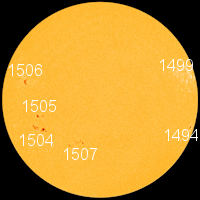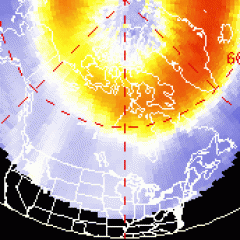SUBSIDING GEOMAGNETIC STORM: A minor geomagnetic storm that crested during the opening hours of June 12th is subsiding now. At maximum, it ranked 5 on the 0-to-9 K-index scale of magnetic disturbances and turned the skies purple over Dawsonville, New Brunswick:
"The auroras lasted just a couple of minutes, [but they were beautiful]," says photographer Bart Firth. "They were blue to purple in color."
The storm was sparked by an episode of "negative IMF." That is, south-pointing magnetic fields in the solar wind opened a crack in Earth's magnetosphere; solar wind poured in and fueled the display. NOAA forecasters estimate a 10% to 20% chance of similar storms in the next 24 hours as the solar wind continues to blow. Magnetic storm alerts: text, voice.
more images: from Guillaume Poulin of Cookshire, Québec, Canada; from Christopher Gregg of Mount Washington Observatory, New Hampshire; from Gilles Boutin of St-Michel Québec Canada;

![]()
Solar wind
speed: 372.9 km/sec
density: 2.3 protons/cm3
explanation | more data
Updated: Today at 1536 UT
![]()
X-ray Solar Flares
6-hr max: C1 0910 UT Jun12
24-hr: C2 0315 UT Jun12
explanation | more data
Updated: Today at: 1500 UT
![]()
![]()
![]()
Daily Sun: 12 Jun 12
![]()
![]()
Crackling with C-class solar flares, a phalanx of sunspots (1504 - 1507) is turning toward Earth. Credit: SDO/HMI
![]()
![]()
![]()
Sunspot number: 114
What is the sunspot number?
Updated 11 Jun 2012
Spotless Days
Current Stretch: 0 days
2012 total: 0 days (0%)
2011 total: 2 days (<1%)
2010 total: 51 days (14%)
2009 total: 260 days (71%)
Since 2004: 821 days
Typical Solar Min: 486 days
Updated 11 Jun 2012
The Radio Sun
10.7 cm flux: 134 sfu
explanation | more data
Updated 11 Jun 2012
![]()
![]()
![]()
Current Auroral Oval:
![]()
Switch to: Europe, USA, New Zealand, Antarctica
Credit: NOAA/POES
![]()
![]()
![]()
Planetary K-index
Now: Kp= 1 quiet
24-hr max: Kp= 5 storm
explanation | more data
![]()
Interplanetary Mag. Field
Btotal: 6.7 nT
Bz: 1.4 nT south
explanation | more data
Updated: Today at 1536 UT
![]()
![]()
![]()
Coronal Holes: 12 Jun 12
![]()
![]()
There are no large coronal holes on the Earthside of the sun. Credit: SDO/AIA.





